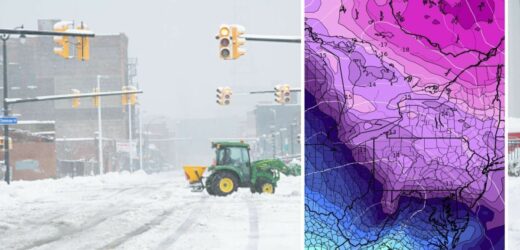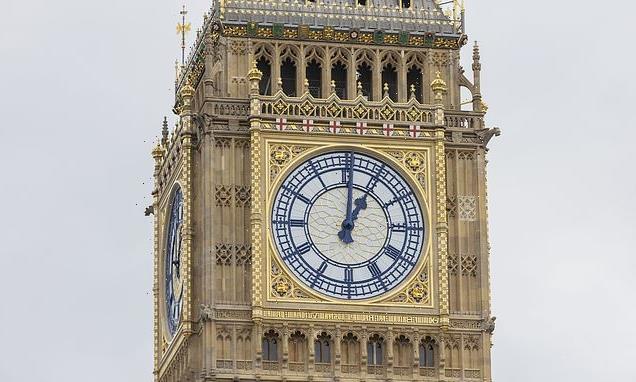CBS: "Thunder snow" hits Buffalo area crippling population
We use your sign-up to provide content in ways you’ve consented to and to improve our understanding of you. This may include adverts from us and 3rd parties based on our understanding. You can unsubscribe at any time. More info
Northern parts of the USA have been hit by a huge, historic, snow storm which has seen up to 6ft of snowy blizzards “paralyse” some areas, with travel bans put in place for safety reasons. More than eight million people across six Great Lakes states were plunged into winter weather alerts over the weekend, including Wisconsin, Michigan, Indiana, Ohio, Pennsylvania, and New York. But with conditions finally starting to ease, highways have started to reopen and bans on movement between cities such as Lake Erie and Lake Ontario have been lifted. In a briefing just yesterday, New York governor Kathy Hochul said: “Without a doubt, this is one for the record books.”
The Met Office offered some explanation over what went on across the other side of the Atlantic and said: “Lake effect snow occurs when cold air from the Arctic moves over warm waters. The warm and moist air rises and cools quickly forming shower clouds.
“If the wind direction remains similar, bands of snow showers can form giving the same areas persistent heavy snow showers for days.” While the US takes snow in its stride and does expect to see it each winter in some places, such a storm of this capacity saw resource placed in affected areas in a bid to keep communities safe from the sheer amount of snow pummelling millions of people.
Here in the UK, these weather events almost never occur to such a scale. But with a lot of jet streams and low or high pressure systems from the Atlantic dictating the UK’s forecast, many will wonder if this country is set to see any remnance of the wintry conditions the US has just endured.
The answer in short is – yes this weather front will affect the UK – but it will be nowhere near as extreme and will look entirely different by the time it reaches Britain.


Jim Dale, senior meteorologist at British Weather Services, told Express.co.uk that the country is already feeling its impacts, which are more affecting the jet stream than anything else.
He said: “Only from the point of the upswing of the milder semi-tropical air in mid Atlantic mixing with the cold air to the west. This equals a formation of deep lows and active fronts. It is cold with the jet stream roaring our way and that’s why we are where we are currently. There is no transfer of the US freezer to the UK.”
At the start of the month, Met Office forecaster Alex Deakin also shared his take on what the US was set to see – and how this would translate for the UK. He said: “It is going to empower and envigorate the jet stream because the Arctic gets colder and the tropics are still warm.
“But when you see those huge clashes that we’re going to get across the United States that really can take the jet stream up to an extra level – and that’s what we’re going to see. It’s going to drive its way across western parts of the Atlantic and the peak winds in the core of that jet are really going to liven up.”


And Mr Deakin was right – last week the UK saw the majority of areas issued weather warnings for wind and rain with unsettled and turbulent weather continuing to batter Britain – with some winds peaking at 80mph in the north east and parts of Scotland.
Looking ahead for the UK – the prospect of snow is not entirely out of the question. Weather maps indicate some snowfall overnight on December 6 to 7 – but because of how far away this is, confidence remains low.
However, it is the most snow predicted for the country so far this season – with a dusting set to potentially push as low as Leeds, instead of the confinements of the Scottish Highlands.
Mr Dale told Express.co.uk: “It is too far away to be certain of the snow events. As for the coldest period so far, very probably. This is an airstream straight from the Arctic, the caveat is if it happens. If it sticks around for another 2 to 3 days then we can be more confident. It’s not that unusual to see a northerly outbreak in early December, so it is par for the course.”
DON’T MISS
Warning over ‘contagious’ virus in feared tripledemic worse than Covid [REPORT]
UK to track migrant smugglers from space as launch gets approval [INSIGHT]
Caver recalls ‘speechless’ moment uncovering new species of human [REVEAL]
The Met Office’s long range weather forecast for December predicts a more settled period for Britain, which could present the perfect opportunity for snowfall. It says: “Confidence is low, although not unusually so.
“The most likely outcome is that conditions will become generally more settled as high pressure moves towards or over the UK, bringing drier and calmer weather than of late, especially in the north.
“Temperatures are likely to trend from near average towards below average at times, with an increased risk of frost and fog. Any spells of more unsettled weather are more likely to be across the south of the UK, at least for a time, whilst northern areas remain drier.”
Source: Read Full Article


